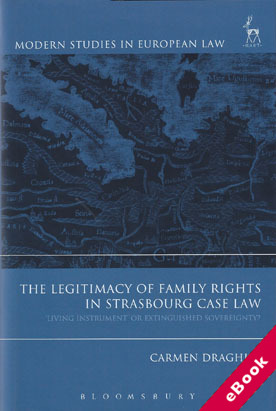
The device(s) you use to access the eBook content must be authorized with an Adobe ID before you download the product otherwise it will fail to register correctly.
For further information see https://www.wildy.com/ebook-formats
Once the order is confirmed an automated e-mail will be sent to you to allow you to download the eBook.
All eBooks are supplied firm sale and cannot be returned. If you believe there is a fault with your eBook then contact us on ebooks@wildy.com and we will help in resolving the issue. This does not affect your statutory rights.
Modern family life exhibits a huge variety of new forms. Legal responses to these new forms illustrate the continuing differences between European nations. Nonetheless, the Strasbourg Court has been increasingly active in this area, which provides fertile ground for testing the legitimacy of the Court's interpretation of the European Convention on Human Rights.
When national law refuses to recognize a claimed right, litigants regularly reassert that right before the Strasbourg Court. This has forced it to seek answers to complex domestic controversies such as the legal recognition for same-sex partners and transgender persons, the ethics of adoption and reproductive rights, the legal regime for cohabitants, or the accommodation of immigrants' aspiration to family reunion.
Placing family rights at the core of the judicial legitimacy debate, this book provides a critical analysis of the standards of family rights protection under the Convention. It evaluates the Court's interpretive methodology and discusses the tensions inherent in its supranational quasi-constitutional function.
These include the risk of excessive deference to national authorities, at the expense of the effective enforcement of universal rights; the addition of "new rights"; and inattention to the division of responsibilities between democratic processes within sovereign States and the subsidiary international review.